title="Return to Table of Contents">Oberlin Alumni Magazine
Spring 2013 Vol. 108 No. 2

"The good food movement is now a revolution."
—Will Allen, farmer, founder, and CEO of Growing Power
How do we teach for a revolution in something as ordinary and essential as food? The revolution that Will Allen refers to is often described as a social movement for "food justice." Food justice means that everyone, regardless of social or geographic location, has access to fresh and culturally appropriate foods, and, even more, that communities have control over their food security.
In the summer of 2011, Janet, along with students and interns from Oberlin's George Jones Memorial Farm, visited the Fondy Farmers Market in Milwaukee. Given the rising popularity of foodie culture over the past few years, "farmers' market" may evoke images of elite spaces offering organic produce to affluent customers. But Fondy is different: It's in an urban neighborhood, and most of its customers are African American. Hmong Americans and African Americans are among the farmers who sell gorgeous collards and glowing bulbs of garlic. The market accepts food stamps, and in 2012, despite a drought, processed nearly $41,000 through the program. This kind of access to fresh food is essential because many lower-income neighborhoods, both urban and rural, are "food deserts"—places without grocery stores and farmers' markets, and where residents pay more for less at corner stores and gas stations. But the true goal of the food revolution is to facilitate self-reliant communities, and Fondy's support of local farmers is the next step in creating food security for this neighborhood. To make this move from access to justice means asking why some communities are food insecure, what structural forces are creating this insecurity, and how we can change things. The food movement becomes a revolution when we demand social change; teaching for a food revolution starts with asking these kinds of questions.
Kentucky farmer and writer Wendell Berry, a leading thinker in contemporary agrarian philosophy, has written about the failure of the agricultural university to create food democracy and the importance of valuing the experiential knowledge of small farmers. Oberlin's college seal depicting harvested crops next to classroom buildings, with the words "Learning and Labor" written in plain English rather than Latin, symbolizes the college's commitment to the knowledge that comes from working with our hands and the importance of reflecting on this labor in critical, creative ways. The Oberlin Student Cooperative Association—formed in 1950— thrives today with a renewed focus on supporting local agriculture through its purchasing policies. Oberlin's commitment to sustainable agriculture has gained momentum through the years, with Professor David Orr's leadership in agrarian philosophy and pedagogy, the formation of the New Agrarian Center and City Fresh at the George Jones Farm (with the help of Brad Masi '93), and now the Green Belt envisioned as part of the Oberlin Project.
Oberlin is not a land-grant institution. Our students aren't designing the next generation of genetically modified seeds. What students do learn at Oberlin is critical thinking. When it comes to confronting the exploitation of immigrant farmworkers or ensuring that all families have a quality grocer nearby, the food justice revolution needs people versed in the liberal arts who can learn on their feet, buoyed by that Oberlin outrage and energy, so they see the broader social justice and historical contexts that others have missed. All of us need to know why before we learn how.
Here in the "Rust Belt," food justice is being created in abandoned lots and kitchens, in farmers' markets and fields. The people who have taught us the most—both the why and the how—are the urban farmers and community activists who are creating this revolution. Engaging students in learning from the communities themselves is a complex, difficult, and thrilling experience. We believe these kinds of collaborations are essential to educating food citizens—people who take seriously both their right and responsibility to participate in creating a more just food system. English writer G.K. Chesterton once said, "You can never have a revolution in order to establish a democracy. You must have a democracy to have a revolution."
The food movement is full of idealistic college grads who want to go into food deserts and fix things. But some food activists lack awareness of their own privilege. They want to teach urban communities about gardening, but don't realize that many people moved to the city to escape agriculture in the first place. They teach recipes to children that require ingredients available only at Whole Foods. Those of us who are outsiders seeking an invitation into a community need to proceed with care. The antidote to privilege is humility. We need to be willing to take risks and learn from our mistakes. Justice isn't about rescuing people from themselves, as the media's focus on "the obesity epidemic" implies. It's facilitating a resident-driven solution and then getting out of the way. Those of us who are truly interested in food democracy must learn to work with people, not on people. Communities are the subjects and verbs of the change that happens in their neighborhoods and lives, not the objects of our "help." This also means that food activists need realistic goals. We need to know that these are deep, systemic problems that were generations in the making, and that it will take generations to undo them. As much as we all want to be the silver bullet, we're usually not.
In the spring of 2011, Janet led a field trip to Naoma, West Virginia. Students from her American agricultures class had received grants from Oberlin's Green Edge Fund and the Bonner Center for Service and Learning to purchase fruit trees (with help from Alan Leonard '91 at Cummins Nursery) planted at a community center where Emily Arons '10 was helping to develop a community kitchen. As the students started clearing brush in a field behind the center, one shouted, "learning and labor!" It was a sentiment that persisted throughout the semester, leading these students to engage in ongoing, intense discussions about race, class, and structural injustices in the food system, discussions in which Janet was learning along with and from her students. The students asked questions that lacked easy answers—questions about privilege, how to work with communities as an outsider, and the meaning of food justice.
Our hope is that through collaborating with communities, we can point students in the right direction—to the people who are generating grassroots knowledge. We're honored by the patient willingness of community members to engage with us; they teach us how to teach. Part of the work of teaching is knowing that we are students as well. The classroom, the farm, the urban garden, the nonprofit office, and the farmers' market become places where we learn with and from our students, and where we try to reveal and understand this learning process.
Meet the Revolutionaries
Strength in Strategy
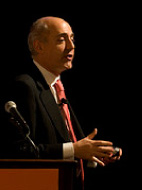
"Last year we did a survey of low-income families," says Josh Wachs '93, the chief strategy officer for Share Our Strength, who works on that organization's No Kid Hungry campaign. "We find that those low- income families are just as interested in cooking healthy food as higher income families. They think the biggest barrier to eating healthy is cost."
Share Our Strength seeks to connect low-income families with programs like SNAP and educational opportunities so that they can learn to best use their limited resources and make healthier choices. They are also studying social obstacles to accessing food assistance programs geared toward children, such as the stigma of school lunch programs. "The simple act of feeding a child has a strong connection to their ability to succeed later in life," Wachs says.
Swamp Fighter

Jumoke Hinton-Hodge '85 is the program director for People's Grocery, a West Oakland, California, food justice organization that wants to build a sustainable and equitable local food system.
"I do community work first and found food to be a mechanism to build community and develop healthy communities," says Hinton-Hodge, who is an elected member of the Oakland Unified District School Board. "I have found food plays a vital role in identity, culture, communities, economics, and, obviously, health."
Hinton-Hodge does not use the common term "food desert" to describe West Oakland. "It suggests that there is a lack of access to food, but in fact there is access to unhealthy and expensive food." She prefers the term "food swamp," because "there is access to food, but not good food."
We/They Not the Way
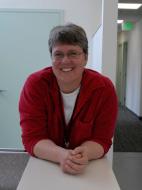
Heidi Nortonsmith '86, executive director of the Northampton Survival Center emergency food pantry in western Massachusetts, says her organization tries to educate lower income residents about healthy eating habits while educating well-resourced consumers about inviting everyone into this circle.
As Nortonsmith puts it: "teaching people that if they can appreciate the value of an heirloom tomato, there should be ways to include everyone in that experience and to question why we would accept the 'we/they' structure of having an heirloom tomato crowd and a Pop- Tarts-for-breakfast crowd."
One way the center addresses this is by encouraging higher income members of a community supported agriculture farm to subsidize the shares of lower income members.
Helping Grassroots Grow
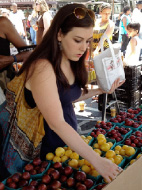
"We are never going to feed our way out of hunger," says Christine Binder '08, outreach coordinator for WhyHunger's National Hunger Clearinghouse, a grassroots support organization that focuses on the causes of hunger in the U.S. and abroad. "Because charity doesn't address injustice, it doesn't end hunger; it merely postpones it. Instead, we need to take a social justice approach—one that promotes food sovereignty and self-reliance—to truly end hunger."
To the Rescue
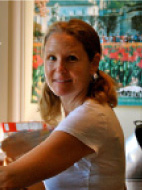
Liz Gregg '90 is part of the food rescue movement, "which means I work to keep usable, edible food from being discarded so that the food can be distributed to food-insecure populations."
She educates businesses in Washington, D.C., about alternatives to throwing away food they feel is not worthy of retail sale, such as two-day-old pie at a local bakery. Gregg, who is doing this as a personal initiative, connects the rescued food to shelters and aftercare and feeding programs.
Gather to Gather

Emily Boston Garofalo '09 is the coordinator of a gleaning program in Tacoma/Pierce County, Washington. The group harvests unused fruit and vegetables from local homeowners and commercial growers to be shared with local food banks; it even promotes "gleaning parties," in which guests convene to gather fruit that otherwise would have gone to waste.
In just its second year of existence, the Pierce County Gleaning Project harvested nearly 20,000 pounds of produce for those in need.
Planting the Seeds
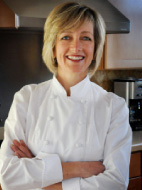
Most observers agree that changing the way people think about food must start early. That's the impetus behind programs like the Berkeley-based Edible Schoolyard Project, which has benefitted from a steady supply of Oberlin students and alumni as volunteers and staff (including Kelsey Siegel '94 and Susie Daloz Walsh '00, who held positions in the Berkeley mothership, and former intern Eloise Reid '09—now the garden manager and teacher at the Oberlin Early Childhood Center—who volunteered at sites in Berkeley and New Orleans).

The project now encompasses a network of school-grounds gardens all over the country, including the Mountain Garden Initiative, which was founded by current students Hilary Neff '14 and Rachel Manning '14 with a $10,000 grant from the Dalai Lama Fellowship and additional support from Oberlin's Creativity & Leadership Fund.

The Edible Schoolyard Project was also an inspiration for Melissa Ritter '84, who founded Heartland Flavors, a business that partners with schools to help create a stronger connection between the cafeteria and locally grown produce. Heartland also has a program to bring chefs to schools for cross-curricular lessons around food, in addition to a number of services geared toward adults.
Field Agent Supporting Farmers in Transition
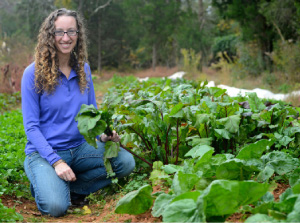 Kronick would rise each morning at 3 AM to make rounds.
Kronick would rise each morning at 3 AM to make rounds.Big Tobacco tends not to make the best protagonist, but plenty of good people have suffered in the wake of its decline. Sandi Kronick '01 saw it happening a decade ago, as regulations designed to snuff out the tobacco industry were crippling the purveyors of storied farms along Tobacco Road—midsized enterprises too small to earn government subsidies but too large to make a living at the farmers' market.
Armed with a modest federal grant, Kronick set about empowering those farmers to find new life amid their withering fields. Out of her efforts came Eastern Carolina Organics (ECO), a produce marketing and distribution company that helps tobacco farmers become growers of organic produce while improving access to fresh fruits and vegetables in the Raleigh-Durham community.
"For many years, healthy eating was for freakish people—very Oberlin-friendly people," says Kronick, a former local food coordinator for her Oberlin co-op. "Just like global warming has become a given, people now really do connect the issues we're having with diabetes and other concerns to a lack of healthy food choices."
And ECO has enthusiastically stepped up to address the problem. Originally a loose network of about 15 growers, it now works with nearly 70 Carolina farmers, some of whom share in ownership of the company. Together, they supply produce to more than 100 clients throughout the region and beyond. High-end restaurants and grocery stores subsist on ECO's harvest, but it's a lifeline to those in greater need: Kronick's "Pennies on the Pound" initiative offers low-cost produce to various "righteous" groups that serve the community.
In ECO's first year, Kronick would rise each day at 3 a.m. to make the rounds in her 18-foot delivery truck. Today, her homespun local movement has spun off into nationwide delivery with annual revenues that have grown from around $200,000 in 2005 to $3 million last year. Best of all: 80 percent of that take is returned to ECO's farmers.

Want to Respond?
Send us a letter-to-the-editor or leave a comment below. The comments section is to encourage lively discourse. Feel free to be spirited, but don't be abusive. The Oberlin Alumni Magazine reserves the right to delete posts it deems inappropriate.